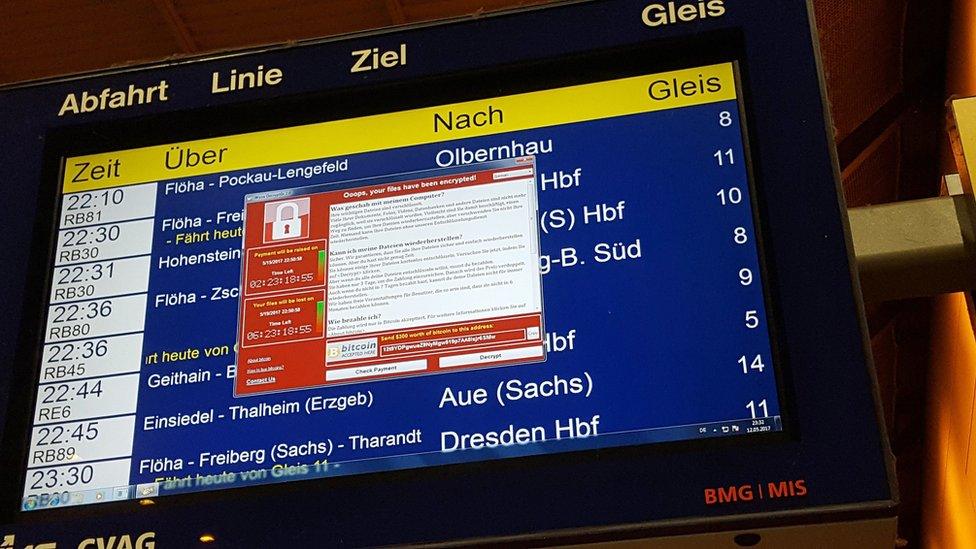Northern Ireland's UK cyber-security research hub
- Published
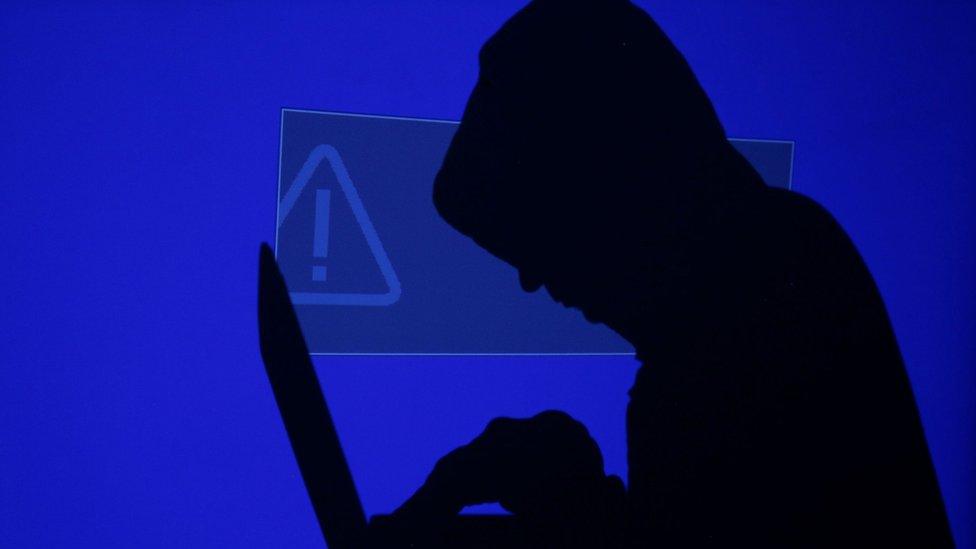
Ransomware is a malicious program that locks a computer's files until a ransom is paid
Cyber security has hit the headlines after an unprecedented cyber-attack brought down computer systems around the world on Friday.
No firms in Northern Ireland have so far been affected by the ransomware attack, which wreaked havoc on organisations including the National Health Service in England and Scotland.
The virus could have spread even further had a cyber security researcher not accidently discovered a "kill switch" in the malicious program.
He was assisted by a researcher from security firm Proofpoint, which has an office in Belfast.
There is no shortage of cyber security experts in Northern Ireland - the industry now employs about 1,200 people.
And there is such a demand for their expertise, they can earn twice the average salary in Northern Ireland.
'Real opportunities'
Invest NI - the region's business development agency - says Northern Ireland is the number one location in the world for cyber security inward investment and the number one global destination for US cyber security companies with an eye for international expansion.
Invest NI said companies had been enticed by the "hard-to-find" skillsets being nurtured at Queen's and Ulster University.
"Companies such as Black Duck, Rapid 7, Proofpoint, Alert Logic and Whitehat are recent investors here," said a spokeswoman.
"And with Symantec, a security software vendor, predicting the number of job openings to rise to 6m globally by 2019, there are real opportunities for our talented workforce."
Emily McDaid writes about all things tech and edits the Techwatch blog for Catalyst Inc Connect, a not-for-profit network that runs a number of programmes to help innovation companies get off the ground or grow.
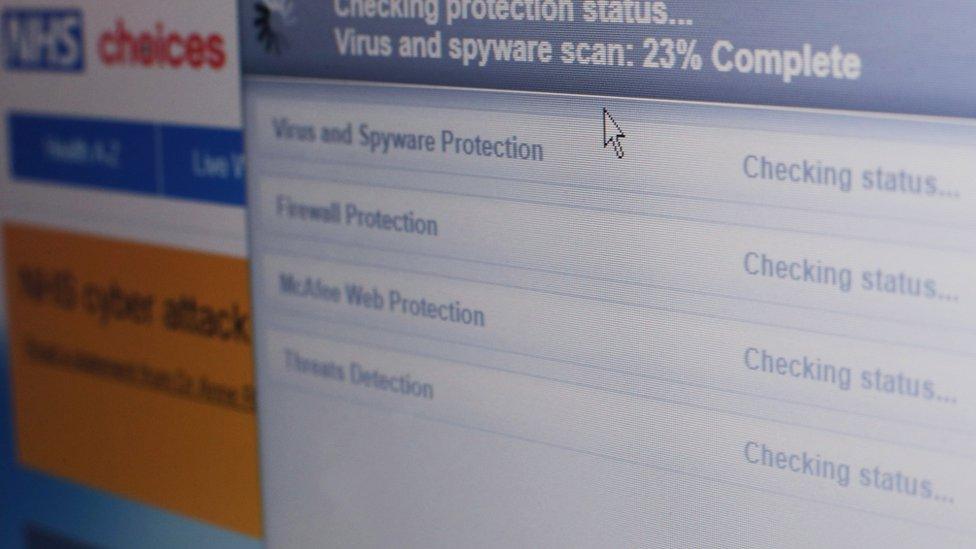
The ransomware that hit the NHS in England and Scotland has infected 200,000 machines in 150 countries since Friday
Northern Ireland has a booming tech sector, she said, particularly in the fields of cyber security, data analytics, fintech (software for the financial sector) and blockchain - the technology underpinning the digital currency Bitcoin.
"London is no longer the go-to place," she said. "Northern Ireland is a cheaper place to live and do business. And if the corporation tax was to be lowered, that would be massive for the sector."
Cyber security has become big business for corporate firms and start-ups in Northern Ireland, she said, and they are in the unique position of working in both the Irish and UK markets.
She has written about a start-up in Belfast, one of only two companies in the world, which uses a person's heartbeat as a way of identification, as opposed to fingerprints or retinal scan.
Then there are the two female cryptography experts looking at how to keep data safe when quantum computing becomes a reality - quantum computers will be so clever they will be able to break security algorithms easily, and hack data in seconds.
'0% unemployment rate'
In addition to working with at least 500 entrepreneurs each year, Mrs McDaid's organisation inspires young people to pursue careers in tech and innovation.
"Cyber security is so big at the moment, it has an 0% unemployment rate," added Mrs McDaid.
"The more NI becomes a recognised centre of innovation, the more you will get the talent coming up through the generations."
Last week, two international conferences were held in Belfast on the issue of cyber security - it is a burgeoning industry because with every technological advance comes a new opportunity for criminals to exploit it.
One of the conferences was hosted by the Centre for Secure Information Technologies (CSIT), based at the Northern Ireland Science Park in Belfast's Titanic Quarter.
CSIT, which is part of Queen's University Belfast, is home to the UK's largest cyber-security research cluster.
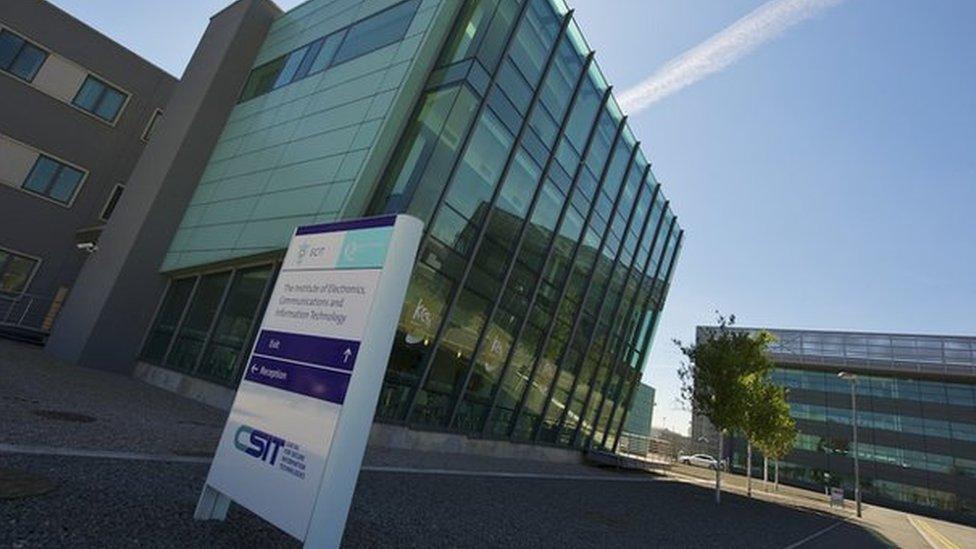
CSIT is one of three research centres within the Institute of Electronics, Communications and Information Technology at Queen's University Belfast
David Crozier, head of strategic partnerships and engagement at the major research hub, says it has a "critical mass of researchers" looking at malware, network security, encryption and critical infrastructure.
He said the centre had acted as a magnet for companies, attracted by the research and skilled workforce.
While it is a global export-based business, with most firms working for multi-nationals, the industry is a significant contributor to the economy, says Mr Crozier.
"The skills are so in demand at the moment that the industry is on course to generate salaries of £60m per annum," he said.
"For those citizens with the knowledge, they are able to earn about £42,500 per year - the average salary here is about £23,000."
'Unsung heroes'
Northern Ireland as a whole also wins because it means some of the world's foremost cyber-security experts are living here.
"Citizens not working in the industry will benefit from the expertise and all the work that is going on to ensure government and public service systems are resilient and secure," said Mr Crozier.
"They can never be 100% secure and breaches are a daily occurrence, even for big companies, but more often than not, networks will be protected."

Experts warn that ransomware is the fastest growing form of computer virus
Mr Crozier is part of a working group, which includes the police and various government departments.
Since last year, it has been operating as the NI Cyber Security Framework for Action and its aim is to ensure a co-ordinated approach to cyber security.
The group has formulated a set of priorities and while the political deadlock at Stormont means they are still unpublished, Mr Crozier says the work is certainly not on hold.
"The man on the street doesn't want to think about cyber security," he added.
"But the public needs to know there are people working behind the scenes to protect networks and keep ahead of attackers.
"They are unsung heroes and they only come to prominence when a major event happens."
- Published14 May 2017

- Published15 May 2017
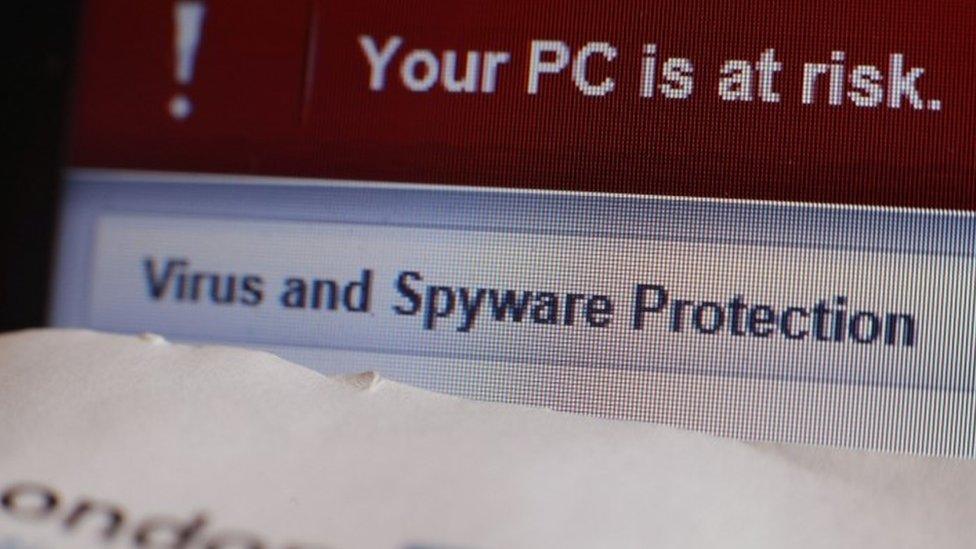
- Published15 May 2017
